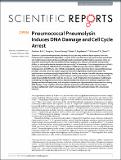| dc.contributor.author | Kwang, Jimmy | |
| dc.contributor.author | Engelward, Bevin P | |
| dc.contributor.author | Rai, Prashant | |
| dc.contributor.author | Chow, Vincent H. | |
| dc.contributor.author | He, Fang, 1956- | |
| dc.date.accessioned | 2017-04-21T22:27:09Z | |
| dc.date.available | 2017-04-21T22:27:09Z | |
| dc.date.issued | 2016-03 | |
| dc.date.submitted | 2015-11 | |
| dc.identifier.issn | 2045-2322 | |
| dc.identifier.uri | http://hdl.handle.net/1721.1/108369 | |
| dc.description.abstract | Streptococcus pneumoniae produces pneumolysin toxin as a key virulence factor against host cells. Pneumolysin is a cholesterol-dependent cytolysin (CDC) toxin that forms lytic pores in host membranes and mediates pneumococcal disease pathogenesis by modulating inflammatory responses. Here, we show that pneumolysin, which is released during bacterial lysis, induces DNA double strand breaks (DSBs), as indicated by ataxia telangiectasia mutated (ATM)-mediated H2AX phosphorylation (γH2AX). Pneumolysin-induced γH2AX foci recruit mediator of DNA damage checkpoint 1 (MDC1) and p53 binding protein 1 (53BP1), to sites of DSBs. Importantly, results show that toxin-induced DNA damage precedes cell cycle arrest and causes apoptosis when DNA-dependent protein kinase (DNA-PK)-mediated non-homologous end joining is inhibited. Further, we observe that cells that were undergoing DNA replication harbored DSBs in greater frequency during pneumolysin treatment. This observation raises the possibility that DSBs might be arising as a result of replication fork breakdown. Additionally, neutralizing the oligomerization domain of pneumolysin with monoclonal antibody suppresses DNA damage and also cell cycle arrest, indicating that pneumolysin oligomerization is important for causing DNA damage. Taken together, this study reveals a previously unidentified ability of pneumolysin to induce cytotoxicity via DNA damage, with implications in the pathophysiology of S. pneumoniae infection. | en_US |
| dc.language.iso | en_US | |
| dc.publisher | Nature Publishing Group | en_US |
| dc.relation.isversionof | http://dx.doi.org/10.1038/srep22972 | en_US |
| dc.rights | Creative Commons Attribution | en_US |
| dc.rights.uri | http://creativecommons.org/licenses/by/4.0/ | en_US |
| dc.source | Nature Publishing Group | en_US |
| dc.title | Pneumococcal Pneumolysin Induces DNA Damage and Cell Cycle Arrest | en_US |
| dc.type | Article | en_US |
| dc.identifier.citation | Rai, Prashant, Fang He, Jimmy Kwang, Bevin P. Engelward, and Vincent T.K. Chow. “Pneumococcal Pneumolysin Induces DNA Damage and Cell Cycle Arrest.” Scientific Reports 6 (March 30, 2016): 22972. © 2017 Macmillan Publishers Limited | en_US |
| dc.contributor.department | Massachusetts Institute of Technology. Department of Biological Engineering | en_US |
| dc.contributor.department | Singapore-MIT Alliance in Research and Technology (SMART) | en_US |
| dc.contributor.mitauthor | Engelward, Bevin P | |
| dc.contributor.mitauthor | Rai, Prashant | |
| dc.contributor.mitauthor | Chow, Vincent H. | |
| dc.relation.journal | Scientific Reports | en_US |
| dc.eprint.version | Final published version | en_US |
| dc.type.uri | http://purl.org/eprint/type/JournalArticle | en_US |
| eprint.status | http://purl.org/eprint/status/PeerReviewed | en_US |
| dspace.orderedauthors | Rai, Prashant; He, Fang; Kwang, Jimmy; Engelward, Bevin P.; Chow, Vincent T.K. | en_US |
| dspace.embargo.terms | N | en_US |
| mit.license | OPEN_ACCESS_POLICY | en_US |
